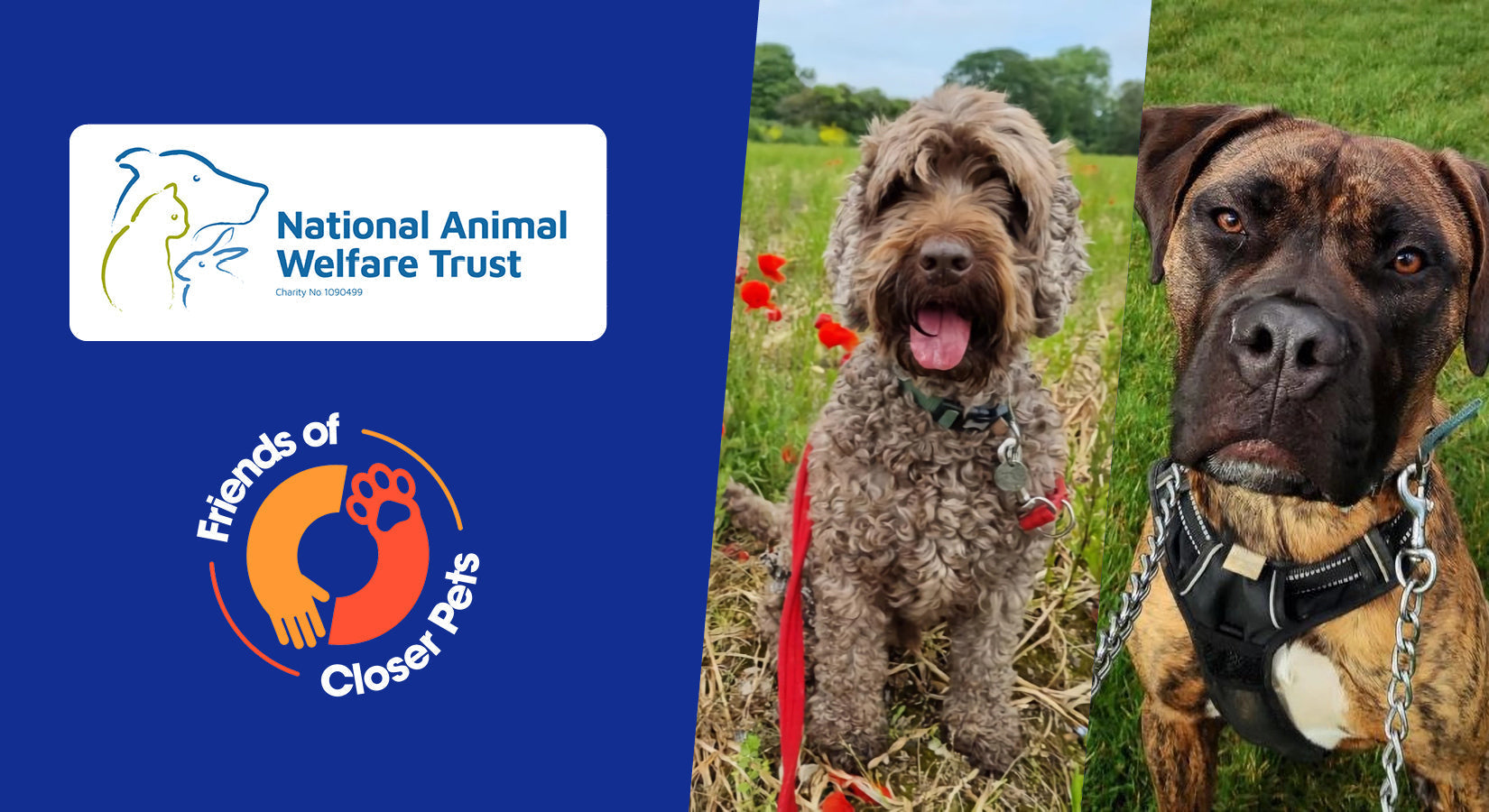We’ve all heard the phrase ‘adopt, don’t shop’, and if you’re looking to welcome some extra paws into your home, there are plenty of reasons why you should choose a dog from a rescue centre. But it’s not a decision that should be made lightly!
To celebrate National Rescue Dog Day, we’ve joined forces with an amazing rescue and rehoming charity and Friend of Closer Pets, the National Animal Welfare Trust (NAWT), to share some top tips on adopting a rescue dog.
Here’s everything you need to know about finding your new forever friend.
Do your research
Dogs have a remarkable talent for capturing our hearts with just one look of those big, beautiful eyes, but try to make your decision with your head too. Remember, it’s not about finding the perfect dog, it’s about finding the perfect dog for you and your family.
The rescue charity teams have lots of experience playing matchmaker to owners’ lifestyles and dogs’ needs, and by asking the right questions, you can get the complete low-down on each pup to help you both start life off on the right paw. What’s more, the rescue home needs to know you’re a responsible owner, so by talking to them in depth, you’ll demonstrate your commitment to providing the perfect home.
"It is important to fully discuss your requirements with the member of our homing team. The more information about your home life the better, as that will allow us to match you with the most suitable dog we have in our care" - Director of Operations at NAWT, Andrew Gillon.
So, find your local dog rescue centre by searching for ‘dog adoption near me’ or ‘dog shelters near me’ in your search engine, contact them to book in a visit and familiarise yourself with these seven essential questions…
- What’s their backstory?
It’s important to know your potential new ‘pawtner’ in crime’s history, as this can give you an insight into any special requirements they might have. For example, some rehomed dogs can suffer from separation anxiety due to past experiences, whereas a dog surrendered solely due to a change in their past owner’s personal circumstances might already be very well-trained.
The shelter can provide you with information about the dog’s previous homes and the circumstances that led to their arrival. It’s important to keep in mind that some dogs may have had multiple homes through no fault of their own.

Caesar- NAWT, Bedfordshrie Centre
- What breed (or mix of breeds) are they?
When rehoming a dog, knowing the breed or likely mix of breeds can help you predict their potential size if they’re a puppy. It can also give you an insight into their common characteristics, such as their energy levels and exercise needs – for example, a young spaniel could be a bundle of boundless energy, while an older Labrador is unlikely to become your new marathon training buddy.
One reason why rescue dogs are the best is their potential to be completely unique due to being a mix of breeds – but it’s important to do your research to ensure you can meet their needs.
"We always suggest doing research on any specific breed that you would like to home. Different breeds have different behaviour traits, exercise needs and health requirements. Doing the research will help you get a dog who fits with your lifestyle." - Director of Operations at NAWT, Andrew Gillon.

Lupin- NAWT, Hertfordshire Centre
- What are their likes and dislikes?
Although their breed will give you an indication of their personality, every canine companion is different – no-one will know them better than their rehoming centre. You may be dreaming about climbing mountains together or a work-from-home lap dog, so it’s important to know if you’re going to be a good match for each other.
Ask the team what they’ve learned about a particular pup’s personality and – the fun bit – their quirks. Don’t forget to ask how they get on with children, strangers and other pets. Do they have any behaviour problems? Are these something you can support?
If you’re wondering if rescue dogs can be trained, the answer is yes – and knowing their key personality traits will make training a calmer and smoother process for everyone. The rescue team will have extensive knowledge of how to navigate any issues and support you in helping the dog move past a bad start in life.

Paddy- NAWT, Cornwall Centre
- Do they have any additional health needs?
Rescue centres are dedicated to keeping their residents happy and healthy, and many of them will have already been microchipped and vaccinated before you take them home. It’s also worth asking if the rescue dogs are neutered at the centre.
What’s more, it’s important to know what kind of care you will need to initially provide and if there are any known health conditions that may limit the activities the dog can take part in or incur veterinary costs down the line. Remember to ask what they’re currently being fed so you can stick to that feeding regime for at least the first few days to avoid stomach upset.

- Are they toilet trained?
A rescue dog might need some potty training but don’t let this put you off, as the same applies to puppies from a breeder. But you need to be prepared for the time and effort required to help them learn proper toilet behaviour. If it’s an older dog, try to get to know what their triggers are, and remember that all dogs can be prone to little accidents when they first move to a new home.
- Is my home suitable for a rescue dog?
Your rescue-dog fact-finding mission is a two-way street, and the dog rescue centre needs to be assured that you’re the right owner for your chosen dog – and will provide them with a loving and suitable home. That’s why a supervised visit is often part of the adoption process, giving the charity chance to see your living environment and also for the dog to meet your family and any other pets.
"If you already have a dog in your home, it is important that they meet the new dog that is coming into your home and have at least one meet where that can interact off lead."- Director of Operations at NAWT, Andrew Gillon.

Flash- NAWT, Clacton Centre
- Can I foster the dog first?
To ensure you’re ready to commit to everything that comes as part and parcel with dog ownership, it’s worth considering having a trial run by fostering a dog first – especially if you’ve never owned a dog before. Consider it a ‘test drive’ for owning a dog and making sure your family, children and any existing pets are happy and comfortable with the new furry face.
Questions to ask yourself
As well as the common questions you need to ask yourself before committing to a new canine companion, there are specific ones when adopting a rescue dog.
The main one is to ask yourself if you have the time available during those all-important first weeks to help them settle into their new home and establish routines. This can be a ‘make or break’ period, especially if your rescue dog is anxious or has had negative past experiences, so it’s important that you have the time and patience to ease your dog into their new life.
"When you take your new dog home for the first time, it’s important to give them time to settle in. Keep your home quiet from visitors for the first few days and allow the dog to find their feet and get to know their surroundings. Provide them with a comfortable safe space in a quiet spot, so they have a place to rest by themselves."- Director of Operations at NAWT, Andrew Gillon.
We’re here to help
Here at Closer Pets, our products can start you and your new dog on your life-long journey together. You might already have some of these items, but if you’re a first-time fur parent, here’s what you might need:
- Feeder – We recommend initially sticking with the type of food your rescue dog is already used to so they – and their tummies – feel settled. Plus, an automatic dog feeder will help you stick to a set mealtime routine.
- Water fountain – Pet fountains are more hygienic than a traditional water bowl, as the circulating water can also stop any nasty build-ups in their tracks.
- Dog door – As your rescue dog gets more confident, you might want to introduce them to the great outdoors. There are lots of options out there, from simple lockable pet doors to smart pet flaps that grant entry using your dog’s microchip.
Last but not least, our 'Get Closer' pack includes some of the essentials you’ll need in one handy starter bundle, including a water fountain, pet wipes and an automatic pet feeder. So, while you take care of making your new companion feel at home, we’ll take care of the practical stuff – helping you keep them fed, watered and clean.

Rescue dogs make wonderful pets and choosing a new loving companion from a rehoming centre can be incredibly rewarding. At Closer Pets and NAWT, we’re with you every step of the way!

